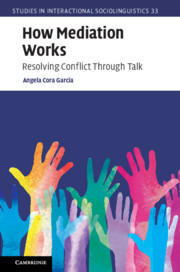Book contents
- How Mediation Works
- Studies in Interactional Sociolinguistics
- How Mediation Works
- Copyright page
- Dedication
- Contents
- Acknowledgments
- 1 Introduction
- 2 The Interactional Organization of Mediation
- 3 Minimizing and Managing Argumentative Talk in Mediation
- 4 Disputants’ Opening Statements and Persuasive Arguments in Mediation
- 5 Mediator Representation of Disputants’ Positions
- 6 Soliciting Proposals for Resolution of the Dispute
- 7 Producing Ideas for Resolution of the Dispute
- 8 Mediator Teamwork
- 9 Autonomy, Empowerment, and Neutrality in Divorce and Small Claims Mediation
- Appendix: Transcription Symbols
- References
- Index
5 - Mediator Representation of Disputants’ Positions
Published online by Cambridge University Press: 29 July 2019
- How Mediation Works
- Studies in Interactional Sociolinguistics
- How Mediation Works
- Copyright page
- Dedication
- Contents
- Acknowledgments
- 1 Introduction
- 2 The Interactional Organization of Mediation
- 3 Minimizing and Managing Argumentative Talk in Mediation
- 4 Disputants’ Opening Statements and Persuasive Arguments in Mediation
- 5 Mediator Representation of Disputants’ Positions
- 6 Soliciting Proposals for Resolution of the Dispute
- 7 Producing Ideas for Resolution of the Dispute
- 8 Mediator Teamwork
- 9 Autonomy, Empowerment, and Neutrality in Divorce and Small Claims Mediation
- Appendix: Transcription Symbols
- References
- Index
Summary
One of mediation’s main advantages over other forms of conflict resolution is the autonomy it provides disputants. Disputants in mediation have the opportunity to tell their own story instead of having a lawyer speak for them, and are helped to create their own agreement instead of having a judge or arbitrator decide for them. While mediators work hard to protect disputants’ autonomy and maintain neutrality relative to the dispute, they also have the responsibility for facilitating the session (Burns 2007). Several previous studies have identified potential problems with mediators’ facilitation of the process of mediation which may interfere substantially with disputants’ autonomy. For example, by controlling topic shifts during the session, a mediator can influence the discussion of problems and proposals while officially remaining neutral.
- Type
- Chapter
- Information
- How Mediation WorksResolving Conflict Through Talk, pp. 119 - 148Publisher: Cambridge University PressPrint publication year: 2019

